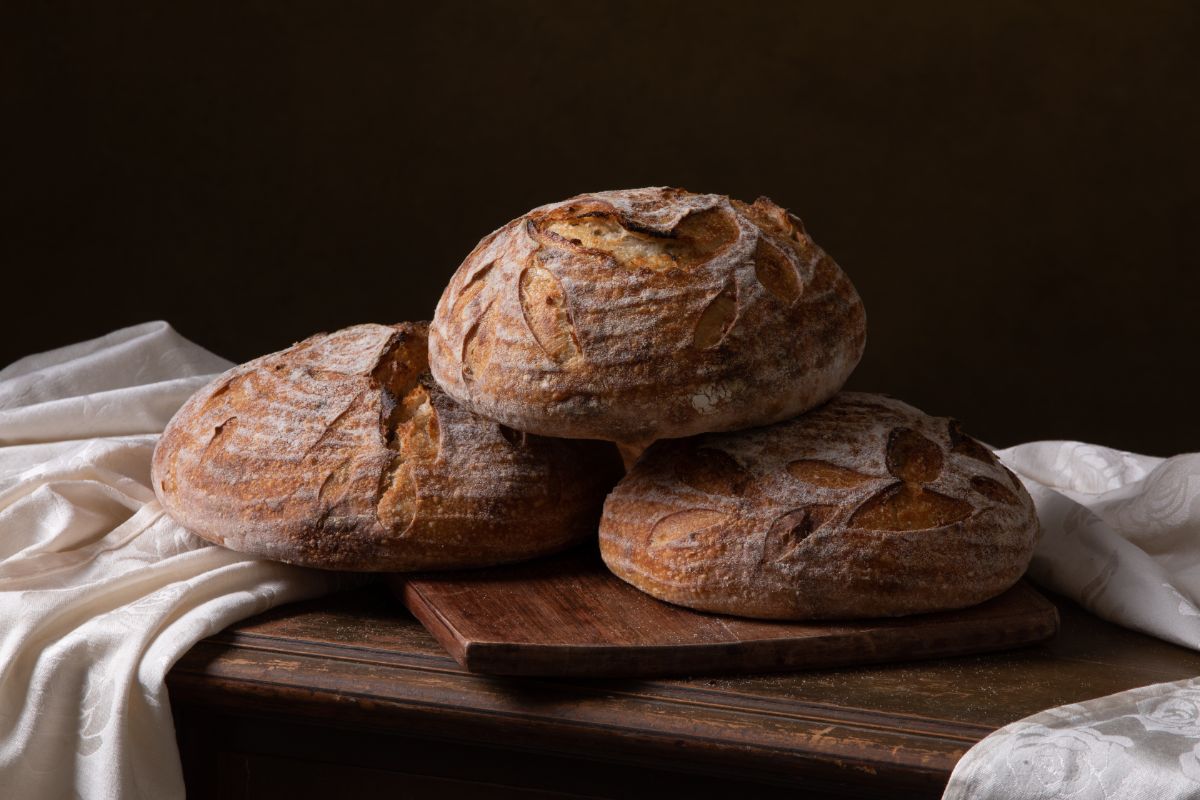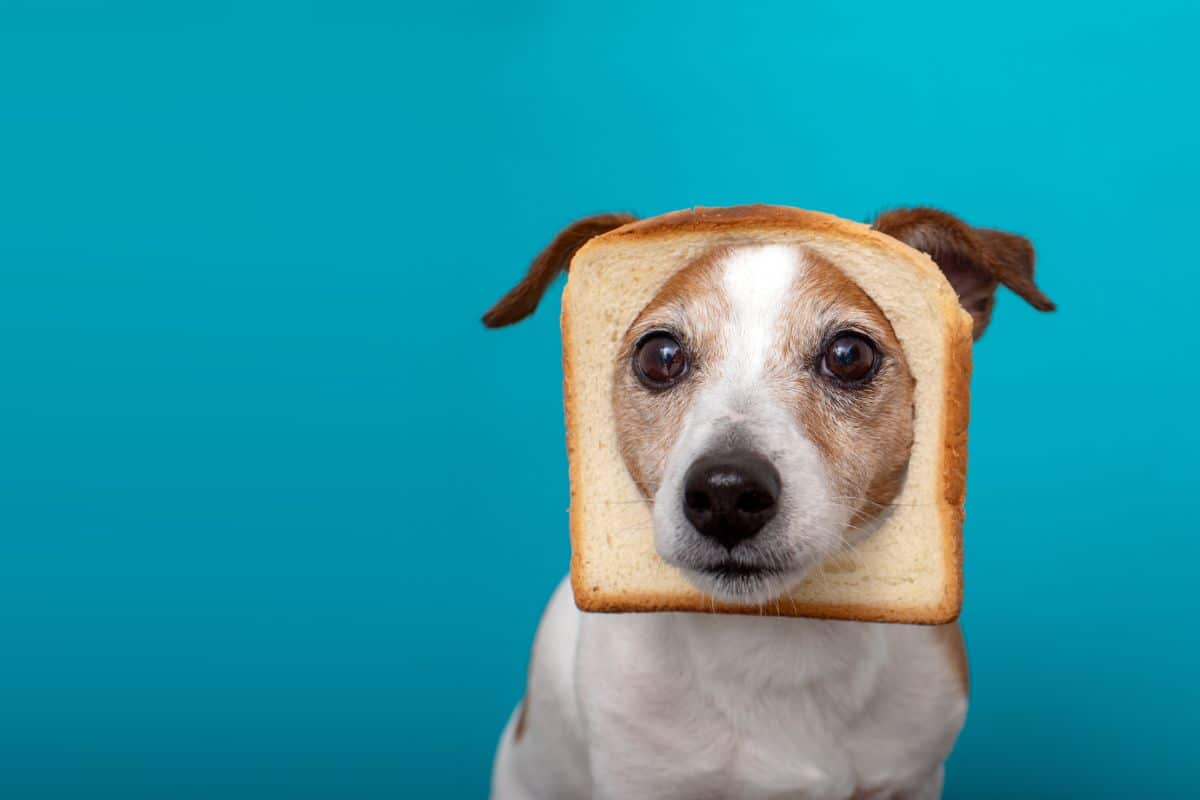When the passion for sourdough bread started to take shape, I wanted my furry friend to also enjoy the wonderful taste of this bread and its health benefits.

When I adopted my first puppy and brought him home I had no idea what I should and should not give him.
All I knew for certain was no caffeine and no chocolate. You constantly learn as you and your puppy grow together about what they should and should not eat, and most of the time they can’t eat what we like the best.
So, is sourdough bread good for dogs? Cooked sourdough bread is not harmful to dogs. However, it is not recommended to give to your dog. If you were to give your pet bread it would need to be in moderation and preferably white or wheat bread. Uncooked sourdough and regular bread dough is definitely a food that your dog should not eat and here are why.
*This article may contain affiliate links. As an Amazon Associate, I earn from qualifying purchases. Please take that into account.
- Dutch oven
- Large mixing bowl
- Measuring cups and spoons
- Bread thermometer (fancy or a budget one)
- Scoring lame
Extra (nice to have):
- Kitchen scale
- Dough scraper and bowl scraper (yes, they are different)
- Cooling rack
- Baking stone (you don’t need a dutch oven if you use this)
👉Learn how to make bread and pizza with this awesome book.
Extreme Bloating
Unfortunately, this can happen in a dog’s stomach when it eats sourdough bread, due to their warm body temperature.
According to the ASPCA Animal Poison Control Center, the moistness and heat in a dog’s stomach is an ideal place to cause the dough to rise while inside them. This can cause a dog to bloat quite severely which is known as Gastric Dilation Volvulus (GDV).
The release of carbon dioxide in the stomach is what causes a dog to bloat resulting in pain and discomfort.
Symptoms of Bloating (GDV)
If you suspect that your dog has eaten some raw sourdough, here are some possible symptoms to keep an eye out for:
- Excessive drooling
- Shallow breathing
- Pacing
- Bloating
- Vomiting
- Disorientation
- Abdominal pain
- Depression, anxiety, and restlessness
Alcohol Poisoning
Furthermore, as the wild yeast ferments in the stomach, it produces alcohol, and the alcohol can be absorbed into the bloodstream. This can result in alcohol poisoning and when dogs suffer from alcohol poisoning their blood sugar, blood pressure and body temperature can drop severely.
However, keep in mind that the severity of alcohol poisoning depends on numerous factors such as how big and how much the dog weighs and how much they ate of uncooked sourdough.
Symptoms of Alcohol Poisoning
Here are some possible symptoms of alcohol poisoning to keep an eye out for:
- Slow reflects
- Trying to vomit
- Hyperactivity
- Panting
- Elevated heart rate
- Weakness or staggering
- Hypotension or low blood pressure
Treatment for Sourdough Digestion
If you suspect that your dog has digested some dough and is showing some of the symptoms listed above, it would be best to take your furry friend down to your local veterinary clinic.
Your local vet will be able to give you the most accurate treatment advice as it varies from a number of variables such as your dog’s weight, size and how much they have consumed.
However, here is a list of the possible treatment options:
- Coldwater: Giving your dog plenty of cold water to drink may reduce the speed of yeast fermentation. This can assist with the removal of dough from your pet’s stomach.
- Emesis: Otherwise known as vomiting, your vet may induce your dog to vomit the toxic dough or they may do it naturally.
- Gastric lavage: Best known as stomach pumping. This is usually done by vets to remove toxins out of your animal’s stomach.
- Surgical removal: Where the vet surgically removes the dough from your pet’s stomach. Keep in mind that this is very rare and only occurs in severe situations.
- Yohimbine: This is the name of a drug that is used in very rare, worst-case scenarios of animal alcohol poisoning. This is where a dog is extremely
sick and is either comatose or suffering from severe respiratory depression and it works by increasing respiration and stimulating the central nervous system.
If your animal is showing signs of alcohol poisoning, it is best to address this issue first and stabilizing your pet before attempting to remove the dough from their stomach.
Prevention and Keeping Your Dog Safe

Dogs are still man’s best friend. No matter how many times they go through your rubbish, eat your freshly made food off of the kitchen bench and how many holes they dig your dying vegetable garden.
And we sure want to keep them around as long as possible, therefore here are some tips to keep your dog safe while baking your favorite sourdough.
1. Keep rising dough out of reach
The dough takes time to rise which can take hours and understandably, there is no way you are going to spend the entire time watching your dog watch it rise while waiting for the perfect time to jump up and get it.
Keep it up high and out of reach. Kitchen benches are not high enough, I remember my puppy jumping onto our kitchen bench straight off the ground and landing on it with all four paws.
I would suggest window sills and tops of cabinets.
2. Be mindful of what your dog can and can’t eat
As I said earlier, it is a learning process as you grow up together, especially with your first puppy.
But by the learning process, I don’t mean learning from dangerous mistakes but by reading up online each time you are unsure whether or not your pet can consume a certain type of food.
3. Be extra careful around holiday seasons
I understand the holiday season can be stressful when your house is jampacked with family members to be waited on and kids running around. Make it slightly less stressful for yourself by keeping an eye on your furry friend and save yourself a trip to the vet (and an expensive holiday-rate vet bill).
Keeping your pet outside in the backyard while you bake may be the best option, especially if they like to go sniffing around the kitchen while you cook.
Ultimately, cooked sourdough is ok for dogs – in moderation. If you really want to give them bread however white bread or wheat bread would be the best option.
An uncooked dough of any kind of bread can be mild to severely harmful due to the yeast in it.
If you find yourself in a tricky situation where your dog manages to sneak his way into the kitchen while you turned around for just a second, take a deep breath, assess the situation, and call your local vet for guidance.
*This content is not intended to be a substitute for professional medical advice, diagnosis, or treatment. Always seek the advice of your vet or with any questions you may have regarding your pet medical condition.
